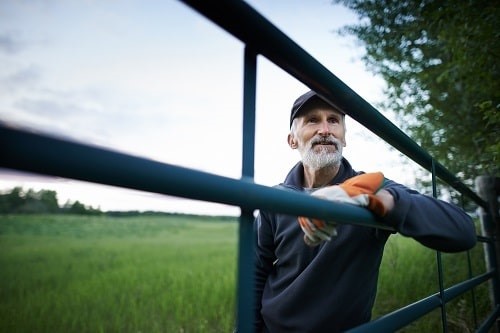The number of deaths on farms fell significantly in the past year, but a charity dedicated to farm safety and mental health has said that HSE figures are still a concern.
News
Farm Safety Week takes place amid ‘sobering’ statistics
The latest Fatal Injuries in Agriculture report, issued by HSE for the start of Farm Safety Week (18–22 July), reveals that 25 people were killed on farms in Great Britain in the past year, compared with 41 in the previous 12-month period.
The oldest farmer killed in the most recent year was 85 and the youngest person killed was a nine-year-old child.
Although, the number of fatal injuries in farming has fallen by around half since the early 1980s, the rate of fatalities is still 21 times higher than the average five-year annual rate across all industries.
 The rate of workplace fatal injury in agriculture remains the highest of any sector. Photograph: iStock
The rate of workplace fatal injury in agriculture remains the highest of any sector. Photograph: iStock
Stephanie Berkeley, manager of the Farm Safety Foundation, which set up the safety week to bring the farming community together and raise awareness, said: “Despite an encouraging improvement in the HSE figures over the past year, these are very sobering statistics.
“The fact remains that, over the past year, 25 people lost their lives on GB farms, so awareness may be one thing, but the time has come for action.
“This is why, a decade on, a focus like Farm Safety Week is still important. When many voices join together to drive a change, this is when it can happen. We should be farming safely every day of the year, not just during Farm Safety Week.”
The National Farmers Union has chosen the campaign to encourage farmers to sign up to a new online learning course the union has developed with Lantra, in conjunction with HSE.
The training reminds farmers about the risks of working at height, with cattle and other risks which have remained the most common causes of death in agriculture for many years.
Sue Thompson, head of agriculture at HSE, said: “Farming families are left devastated every year when their loved ones are killed.
“The numbers of fatalities this year is lower than last, and we are starting to see improvements in some areas, but the pace of change is slow, and the rate of workplace fatal injury in agriculture remains the highest of any sector.”
She said that agriculture would continue to be a priority sector for HSE: “Everyone in agriculture has a role to play in making the changes we all want to see. Together, we can make farming safer.”
Fatal injuries in agriculture report 2021/22 here
Farm safety week is run by the Farm Safety Foundation which campaigns all year round. More information here
NEWS
Sexual misconduct in dentistry: former GDC fellow warns of ‘culture of silence’
By Belinda Liversedge on 05 February 2026
A former General Dental Council (GDC) clinical fellow is calling for a radical shift in how the dental sector manages workplace risk, warning that a “culture of silence” is masking the problem of sexual misconduct in the profession.

Tinnitus UK demands national safety standard as live music workers face hearing loss epidemic
By Belinda Liversedge on 03 February 2026
Tinnitus UK is calling for clear, enforceable standards on hearing protection and training after a staggering 93 per cent of live music workers report hearing problems.

New research links leadership values to reduced workplace incidents
By Belinda Liversedge on 30 January 2026
Age and gender matter less than leaders’ values when it comes to influence on safety performance, reveals new research.



